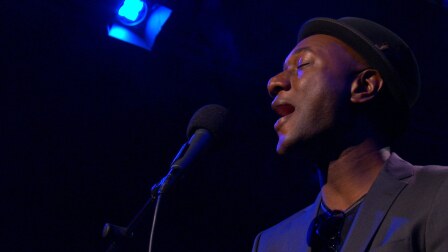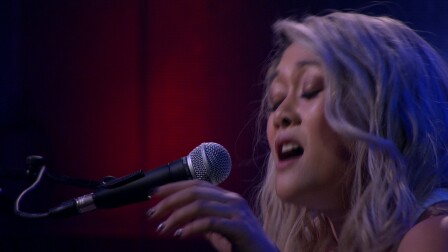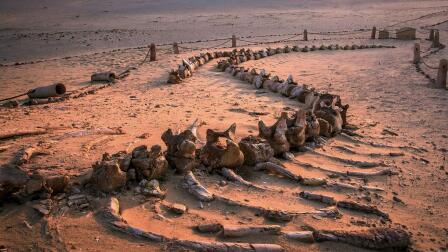
First Person: Ceci Bastida
From Latin alternative rock to politically-charged hip-hop, Ceci Bastida brings highly-rhythmical sound to Artbound Presents Studio A.
Discover more about Ceci Bastida in her own words.
On her musical roots in Tijuana.
I started playing with a band called Tijuana No when I was 15 years old. It started off because we sort of lived in the same neighborhood and these guys were older than me and they knew that I played piano, because all the families sort of knew each other. It was just like literally a block from my house so I used to go there, I had my little Casio keyboard and we got together and played during a summer of that year, pretty much every night. Then all of a sudden, people started inviting us to play shows. It starting happening without really thinking about it so that was the fun part because there was no expectation. There was never talk about making an album or touring. There was nothing like that. It was just having fun and then all of a sudden all these opportunities presented themselves. Before we knew it, we were already signing with a label and we won a rock contest so it was fun because it was so organic. There was nothing planned.
On the origins of Tijuana No's name.
I was born in Tijuana. I grew up in Tijuana. All the members pretty much grew up in Tijuana. And we were a very political band. I think one of our main issues was that we were living next to the most powerful countries in the world and trying to identify ourselves as Mexicans because people would say that people from Tijuana want to be Americans. So I was kind of rejecting this idea that we were American and also rejecting certain things that we weren't that we didn't like about our country and about our city about the world around us. It's very kind of vague almost but it was rejecting the things we were against.

On the social and political messages of their music
With Tijuana No, we had a mix. It had to do with the fact that we had different musical influences. The older ones were very much into punk rock; I was into reggae, ska, The Clash. There was one that was into hard rock, which I didn't connect with at all musically. And then there was another one, his family was very much in touch with indigenous instruments and folk music. He brought that kind of music or those kinds of instruments to the music that we were doing, so it was a strange mix and people didn't understand what we were doing, people didn't understand what it was but people generally say that it is punk rock with ska but definitely with a lot of Mexican or indigenous instrumentation and rhythms that we try to incorporate.
On Tijuana's cultural influence to their music
There's always been waves and there's always been really interesting music coming out of it. I think it's the fact that we are close to the U.S. In our case, in particular, we were so close to the U.S. that we were able to cross the border with no problem and go see great concerts that would never go to Mexico at least not at that time. It was a great influence for us to be able to see these live bands but also, a lot of things were happening in Mexico with Zapatista army, with the murder of a candidate for the PRI, which was the main party back then. The signing of NAFTA. There was so many things happening, especially in 1994. And I think that made a lot of people want to be aware of what was going on in Mexico, wanted to support the indigenous community not just the Chiapas one, but you kind of focus more on what was going on in Mexico, which maybe you didn't do so much before that happened. So I think it was an interesting time because everybody was wanting to change Mexico, sort of what is happening right now I think, but people were very inspired and people were like feeling like a community. People wanted to support each other and support these communities so it was a great time.
I think it was also the fact that the world's eyes were on Mexico. Thanks to the presence of Marcos, it was all about the communities but in the end people were really focused on him, on his personality on his presence so people all over the world were inspired by him and by the movement and I think that also helped us as Mexicans feel like "okay, we can actually do something to change the situation of a lot of people in our country." A lot of things changed but not as much as people were expecting, so it's interesting to see what's gonna happen now. With the stuff that's happening right now.

On the transition to moving to Los Angeles
It was kind of a long transition. I stopped playing with Tijuana No, I think around 1996. I recorded the last album with them and I wasn't feeling a hundred percent comfortable with what we were doing musically or lyrically. Also the relationship between us as members of the band. And I wanted a change. I had been playing with the band, with them for many years and I didn't know what else existed, basically. It was just either high school and that, so I wanted to see what else I was interested in. I wanted to see if there was something that I was missing so I decided to leave the band and go to the university back in Tijuana, study then taught at a school, like a junior high. I taught history and Spanish and English. And then after that, Julieta Venegas asked me to play in her band because her keyboard player didn't have a Visa or something, and she had some shows in the U.S. So I started playing with her and all of a sudden I reconnected with music which I hadn't done in a few years. With Julieta it was just her music, and as much as I had a little bit of freedom to move things around and to change a few things here and there, in the end it's her music. I wanted to work on my own stuff and I was able to do that. We were touring a lot and I was able to do that. And when I felt that I had something together and people were interested in listening to what I was doing, little by little I stopped. I stopped doing some shows with her. She was super supportive. The last thing I did with her was her MTV Unplugged, which I am very proud to be have been a part of it. Then after that, I just focused on my own thing but at that time, I was living in Mexico City so i moved to L.A. after that.
On leaving Mexico City behind
In Mexico City my world was around her stuff. I was touring a lot with her so while I was living in Mexico City, I had a few friends but I didn't really know a lot of musicians and I knew that the reason I was there was because of her. As much as I love it, I wanted to be closer to my family, which is in Tijuana. I wanted to connect with musicians from L.A. that I wanted to work with. It just seemed like the perfect place for me to start my own thing.
I wanted to separate myself from her stuff too because people tend to compare women a lot still, which I think is very strange. But they would think "she is from Tijuana, Julieta is from Tijuana, oh they play together in Tijuana No. She played in her band, they are basically doing the same thing." I wanted to separate myself a little bit from that and focus on my own thing and just do my stuff here and it makes sense, I think musically I just wanted to connect with other people.
On her first album
I was experimenting on my part because I knew what I wanted but I was leaning a lot on the producers of the album and I love the results, I really did, and I still do, but after time I realized. I wanted things to be a little less polished. These producers are amazing but they were very like "there is no room for error, everything has to be like very precise." I think that is what I wanted at the time and then later I realized that I wanted a little bit more, just a feeling that there was a human behind it, a little bit more roundness. Mistakes. There are a lot of times that I am off key a little bit and I'm okay with it. I realized the stuff that I was connecting to, the music that I was connecting to, was music that felt like you know that there was a personality behind it, that there was you know error, that there was mistakes and I feel like mistakes can make everything more interesting because you see a lot of singers that sing perfectly, technically perfectly, but you can't really connect with them sometimes because it just sounds like any other perfect singer. I like singers that have a personality that have something that is very distinct about them and that's what I connect with. And I wanted to and I wanted to show that about me. I am not by any means a great singer but I do what I do and I wanted that to be more present in the second album.

On the album, La Edad De La Violencia
The album is called "La Edad De La Violencia," translates as the age of violence. Even my mom was like "what" but I think it's where I was at that time. I was reading so much about what was going on in the world and I was also pregnant which I think makes you also more sensitive to everything that's going on around you. And to me I was just reading about things that were happening, whether it was in the U.S. with school shootings for example, especially after Sandy Hook. All of them are tragic but that one in particular really affected me. I was looking at that, I was pregnant and then I had my daughter. I thought to myself, I am living in this country where there is gun violence happening constantly. Everywhere. Whether it is in schools or Minuteman or Florida with Zimmerman. You know just stuff happening everywhere that had to do with violence, especially with guns. I was thinking of Mexico too. After 2006 with Felipe Calderon there was chaos and there is still chaos. I felt like we were living in a extremely violent world. And I just couldn't find another title for the album that fit better than that. And then I realized that most of the songs that I was writing talked about violence in different ways, whether it was violence against women or violence against students or kids or drug-related. It just kind of happened. It just seemed like the perfect title.
On the song "Cuervo"
There are three songs on the album that I wrote based on a novel that I really like called "Kafka on the Shore," written by this Japanese author named Haruki Murakami. It was sort of a combination of things. It was a combination of me experimenting with writing from a different perspective and from a different point of view. And what I did is focus on three characters from the novel and wrote songs based on those characters so to me. It was an experiment because I have never done that before, not like this. Musically I also wanted to try completely different instruments that I had never used before. Those are three songs that are based on this novel, where there is violence; there is violence in this novel too. I think I was kind of like a sponge in a way, where I was just absorbing everything; looking at everything. And those songs happened to fit very well with the other songs that I was writing, so it just happened.
On motherhood
I wrote most of the album while I was pregnant. There are two sides of it. There is a practical side where I wanted to write as much as I could because I knew that once I had my daughter it as gonna get a little tricky. And I think I was very naive because I still thought that I was gonna be able to work as you go, "they sleep all the time," you know as newborns. "While she is sleeping I am gonna be working." And no, I had no energy to do anything. So I am glad that I was able to focus while I was pregnant. So I wrote most of it while I was pregnant and you are just in a different state when you are pregnant. You feel so many things and it's so hard to describe. But you are so aware of everything that is surrounding you. You are aware of yourself, of this creature that you are bringing into the world. All of that effected everything I did and that I wrote. There's both things, I guess there is the emotional part of it and the practical part of it. I decided to write most of it while I was pregnant and then once she was born I kind of took a year off just focusing on her and once I felt like we had a rhythm going where I understood her needs, I was able to be more awake and be more sleep deprived. I was able to record properly, part of it long distance with a producer based out of New York and part of it in L.A. It was just kind of like a weird balance. She would be asleep at night and then I would take off and go to the studio and then come back. It was interesting and it was hard.

On reconciling being a mother, touring, and recording
It's a hard thing. One of the things that I think about is what was I doing before I had her? Because I clearly had a lot of time and I didn't take advantage of it maybe. Now it's just this constant planning. "Okay, she is going to daycare now so while she is doing that I will work but while she is doing that I'll have to prepare..." It's just a balancing act you know? I am focusing on how to balance both, where I am able to work on my music but at the same time, I am present in her life and I don't miss anything. So far I have been able to do it and I feel very happy with that. I have to plan everything. Every little detail. That has been the tricky part. When I think about it, like "oh my God, it would be nice to not have this responsibility" for a second, and then I realize no, there is nothing better than having her in the world so I just think, "okay I will figure it out."
On the song "Ven"
It's a song that I wrote while I was pregnant. And I was very pregnant. It's a part of me obviously wanting to meet her and wanting to hold her and part of me also wanting to have her with me and finally getting to meet her. It's all about that. "What will it be like when I meet her? How is she gonna like me?" It's just about her. Wanting to have her with me. She is even on it because we recorded a little bit of her voice, saying her name and singing and we added it to the record and she is very proud of it.
On the gravity of the album
I was sure that I didn't want it to be a negative album. I didn't want it to be dark. I mean, it is I guess in a way but I didn't want it to feel like a very dark album where the music is really dark and down because I also like music that moves me and makes me want to dance. I think those things can be together they don't necessarily have to be separate. So I wanted to do that and I think that was also my way of finding hope. Trying to get a balance because I don't see the world as an awful thing. I see a world that is full of violence sometimes and is full of beauty, too. I wanted to be able to show that in the music somehow. And I think the way for me to do it was with the music being upbeat, being happy. Same thing with the album cover, I wanted it to be beautiful because life can be beautiful.







